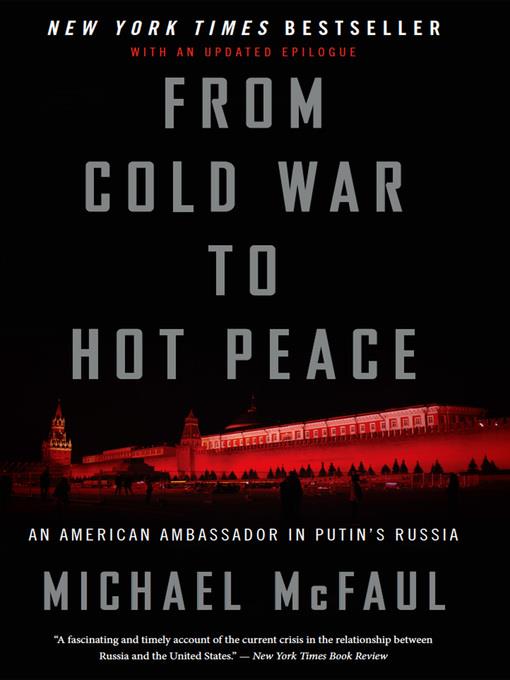
From Cold War to Hot Peace
An American Ambassador in Putin's Russia
کتاب های مرتبط
- اطلاعات
- نقد و بررسی
- دیدگاه کاربران
نقد و بررسی

March 5, 2018
Stanford political science professor McFaul, who was posted to Moscow as U.S. ambassador from 2012 to 2014, provides useful insights into the changing relationship between America and Russia in this smart, personable mix of memoir and political analysis. McFaul first traveled to the then Soviet Union in 1983 as an undergraduate, and his resulting longtime interest in Russia turned to active engagement in 2007, when he was asked to advise the Obama campaign, a role that morphed into a position as special assistant to the president and senior director for Russian affairs. His tenure in the White House and then in Moscow coincided with increased tensions with the Putin regime, which ultimately accused the U.S. of interference in its elections and declared McFaul persona non grata, despite his energetic outreach to the Russian people, which included unprecedented interactions for an American on social media. McFaul does not believe Putinism as it exists today was inevitable, pointing to George W. Bush’s decision to invade Iraq as a “devastating blow to bilateral relations” that might otherwise have continued their post-9/11 progress. The author’s privileged perspective as both an academic and policy maker makes this an essential volume for those trying to understand one of the U.S.’s most significant current rivals. Agent: Tina Bennett, WME.

March 15, 2018
A former U.S. ambassador to the Russian Federation offers a gimlet-eyed view of the new Cold War.In 2014, when he announced that he was leaving his post as the Obama administration's ambassador, McFaul (Political Science/Stanford Univ.; Advancing Democracy Abroad, 2009, etc.) writes that "a prominent pro-Kremlin nationalist told me he was glad to see me go." The reason: McFaul, unlike many politically appointed diplomats, actually knew something about the country, so much so, as a Stanford Kremlinologist, that Putin was said to have feared him. The author returns the favor. As he makes clear, Putin is no friend of the U.S., and in the most recent iterations of the Cold War, especially the proxy struggle to support or undermine, respectively, an independent Ukraine, he has become ever more anti-American while at the same time progressively "weakening checks on his power." In some sense, it did not help that Obama backed off from the old U.S. mission, nominal or not, of spreading democracy. Putin certainly had no problem with spreading autocracy, even as Obama "did not support the use of coercive power to pressure dictatorships into democratizing." But McFaul's post-mortem on the Obama-Putin relationship is of less immediate interest than his view of the current morass. As he notes, Donald Trump enjoys far greater popularity in polls in Russia than at home, and although Putin may not have directly made Trump president--"American voters did that"--Trump has proven to be a highly useful tool for the Russian autocrat's ends. He has validated Putin's claim that the Western media are slanted and untrustworthy, refused to impose congressionally mandated sanctions, and, in his obsession with the "deep state," has played straight into Putin's conspiracy theories. Even if, as McFaul writes, "the American backlash against Russia's meddling in the 2016 presidential election has begun," it may come too little and too late.Of interest to observers of the unfolding constitutional crisis as well as of Russia's place in the international order.
COPYRIGHT(2018) Kirkus Reviews, ALL RIGHTS RESERVED.

June 1, 2018
McFaul (political science, Stanford Univ.; Russia's Unfinished Revolution) served on President Barack Obama's National Security Council and as ambassador to Moscow. His achievements include forging the "reset" in Russian-American relations and, as ambassador, innovative use of social media in breaching official boundaries. This engaging account tells much beyond an ambassador's journal; however, it is thin on examining policies associated with Obama's predecessor. He explains the promise of reset's complex initiatives embraced by Russia's then president Dimitry Medvedev. McFaul's long involvement in forging ties between American nongovernmental organizations (NGOs) and their Russian "civic society" counterparts offers lessons for democratization. The author succinctly identifies the impact on relations resulting from the Syrian imbroglio, the Crimean annexation, antiballistic defense, and the Edward Snowden affair. Vladimir Putin's return to the presidency in 2012 remains the primary cause of reset's demise. Putin believed that McFaul's role was part of an orchestrated "color revolution" directed at Russian regime change. Domestic challenges to Putin revived the trope of a "conservative Russia versus and liberal [evil] west." VERDICT A fine narrative of the rise and decline of America's Russian policy in the Obama years.--Zachary Irwin, Behrend Coll., Pennsylvania State Erie
Copyright 2018 Library Journal, LLC Used with permission.

























دیدگاه کاربران